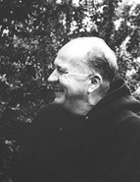Journey Into The Interior Comments
In the long journey out of the self,
There are many detours, washed-out interrupted raw places
Where the shale slides dangerously
And the back wheels hang almost over the edge
...
Read full text
Frankly speaking, I did not understand the poem fully until I read some of the enlightening comments, particularly those of Lantz Pierre and Robert Murray Smith. Thanks to both.
Powerful poem! Theodore Roethke is one of my favorites. I especially love The Waking...
The poet leads us on a journey out of self. This means in our self-actualisation there are interiorities we recognise and those we cannot. The mind has no hope of pinpointing self for it is a moveable feast resting on the physical nature of the brain/ mind. The poet leads us through many metaphorical settings that seems to recognise this.
Thank you @Robert Murray Smith, for this wonderful explanation. Your elaboration helped me understand the poem.
Uh, where's the rest of this poem? It's five times this length. A great, great poem, here bastardized.
And the back wheels hang almost over the edge At the sudden veering, the moment of turning........................................... Terrible imagery but metaphor is unique.
There are a lot of well-worked-out images in this poem, touching on all the senses. It is visual and muscular and tactile and also very emotional for adroit choices and positioning. It is a visceral poem that goes to the gut, the gut we often refer to as basis to our instincts. And still I'm left feeling, in my head, my thoughts, that I don't fully comprehend the journey that's started in the first line. Out of the self. The movement out of the self is one the implies rejection and repudiation, an attempt to escape what is ultimately inescapable. We can change and evolve, seek therapy or anesthetize ourselves with intoxicants, but we remain ourselves, no one else. But Roethke already foresaw that contradiction in the title. He front-loaded the abstract, intellectual argument of the poem in the title and first line, then took us on a wild ride through the real world where we forget that heady stuff and deal with the real journey. It's a really risky stratagem of balance that, for me at least, gives the poem its ultimate impact. The need at the end to circle around and realize that journey, where ever it takes you, in or out, ultimately always leads back to the self.
It is obvious that you invest time and careful thought into both your reading and your commentary of works posted on this site. I would like to thank you and express that your insights are valued additions to this forum. All the best S
lantz, what i relate this poem to are my mountain bike excursions where i was forced from introspection to give my full attention to the immediacy of the trail—large stones that made the bike frame bounce wildly, cactus on one side, steep drop-offs on the other... i wonder if roethke meant nothing more than this. but this is not a long journey—not for me. perhaps he was a lot more introvert than me? -glen
I have never seen anyone earlier who writes a comment after delving so much deep into the poem. Your comment is an ornament that has adorned the poem so beautifully! Thank you.
A powerful use of specific details to convey mood and feelings.

hoe